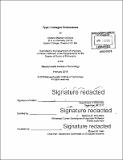Type I collagen proteostasis
Author(s)
DiChiara, Andrew Stephen
DownloadFull printable version (21.51Mb)
Other Contributors
Massachusetts Institute of Technology. Department of Chemistry.
Advisor
Matthew D. Shoulders.
Terms of use
Metadata
Show full item recordAbstract
The folding, quality control, and secretion of collagen presents a significant challenge to collagen-producing cells. Each monomeric polypeptide must undergo extensive post-translational modifications, folding and assembly of the C-terminal propeptide globular domain, and isomerization of hundreds of prolyl bonds into the trans conformation before the mature triple helix can form. The triple-helical domain lacks a traditional hydrophobic core that often drives the assembly and folding of globular proteins. Even once folded, the triple helix is at best marginally stable at body temperature and is prone to local regions of unwinding. The process must be highly orchestrated by the endoplasmic reticulum's chaperone network, including maintaining newly synthesized collagen polypeptides in an unfolded, non-aggregated, and unassembled form until after the extreme C-terminus adopts its folded structure. Despite decades of work, however, the mechanisms of collagen folding remain poorly understood, and collagen quality control is largely unexplored. Misfolding collagen variants cause disease, including osteogenesis imperfecta in the case of collagen-I variants. The origins of pathology in osteogenesis imperfecta and the other collagenopathies are still debated, but what is clear is that collagen proteostasis is strongly disrupted. In this thesis, I report a series of studies targeted at elucidating mechanisms of proteostasis for collagen type-1, the most abundant collagen in the human body. First, I explore the folding and assembly of the critically important C-terminal, globular propeptide domains of collagen-I. My data demonstrate the importance of a single amino acid in the globular C-terminal domain that regulates the oligomerization propensity of 30 kDa C-propeptide monomers. Ultimately, I show that this single amino acid guides the assembly of the C-propeptides of all the fibrillar collagens. Second, I use a quantitative mass spectrometry-based interactomics approach and a novel human cell-based model system to map the components of the wild-type collagen-I proteostasis network. This approach resulted in the discovery of > 25 new putative proteostasis mechanisms that engage collagen-I, as well as led to the discovery of a previously unidentified post-translational modification in collagen-I. Finally, I leveraged this improved understanding of the collagen-I proteostasis network to discover a strategy to selectively increase the secretion of collagen-I from primary cells expressing a collagen-I variant that causes osteogenesis imperfecta. Resolving the disease-associated collagen-I secretion defect may prove valuable in disease.
Description
Thesis: Ph. D., Massachusetts Institute of Technology, Department of Chemistry, 2018. Cataloged from PDF version of thesis. Includes bibliographical references.
Date issued
2018Department
Massachusetts Institute of Technology. Department of ChemistryPublisher
Massachusetts Institute of Technology
Keywords
Chemistry.